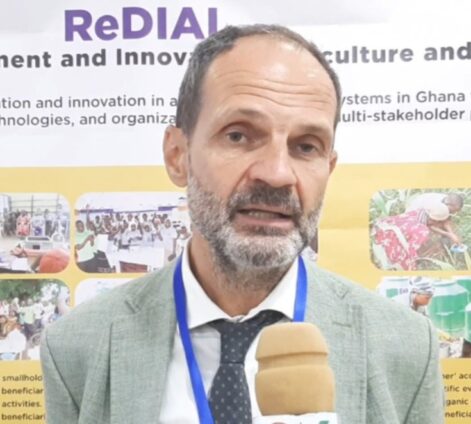
Audio By Carbonatix
The European Union (EU) has emphasized its commitment to support sustainable agricultural projects aimed at increasing yields and empowering small holder farmers.
The Head of Cooperation at the EU delegation to Ghana, Massimo Mina noted that employing sustainable innovative technologies will improve the living conditions of farmers on rural areas.
He spoke at the Research for Development and Innovation Agriculture and Learning – ReDIAL’s closing workshop for beneficiary farmers.
“Through the ReDIAL project, we have seen tangible improvements in the capacity of small holder farmers to improve their knowledge in improved farming technologies; as we close the project, we are confident that the gains made will be sustained through the capacities built, partnerships forged, and communities empowered.”
ReDIAL focused on providing innovative agricultural solutions to small holder grains and cereal farmers, particularly the marginalized, in Ghana’s major food producing zones of Techiman in the Bono East Municipal, Ejura in the Ejura Sekyedumase District of the Ashanti Region.
The rest are Yendi in the Northern Region, Sefwi Wiawso in the Western North Region and Donkorkrom in the Kwahu Afram Plains North District of the Eastern Region.
The four-year project introduced the multi crop threshers to over 11500 small holder farmers in the five project zones, threshing 330,200 kilograms of high-quality grains for almost 1000 farmers (i.e. maize, cowpea, rice and beans) at no cost to them.
This initiative significantly contributed to reduction in post-harvest grain loses in these zones for small holder and marginalized farmers.
The Coordinator of the ReDIAL Project and Executive Director of Friends of the Nation, Donkris Mevuta emphasized that the introduction and testing of FarmSense technology which instantly measures the fertility status of a farmer’s land for cultivation and provides figures of the nitrogen, phosphorus and potassium levels yielded critical results “ignoring soil fertility considerations can result in lower yields, affecting farmers’ income and threatening food security.”
Meanwhile, the project is not only fixated on the promotion of innovation and agricultural development but facilitating the resolution of farmer-herder conflict especially in the Kwahu Afram Plains and the Ejura farming zones.
The ReDIAL Project has been successful in enhancing stakeholders and farmers’ knowledge on soil fertility. It also enlightened and empowered smallholder farmers to adopt various forms of organic soil nutrient enrichment options and utilize localized materials to produce their own compost.
This helped to reduce losses to about 14.3% of total quantity of grains threshed, valued at GHS 225, 412.00.
Latest Stories
-
Barca dominate Levante to claim La Liga top spot
3 hours -
Managing Man Utd the ‘ultimate role’ – Carrick
3 hours -
‘Educate yourself and your kids’ – Fofana and Mejbri racially abused
4 hours -
Vinicius scores but Real Madrid beaten by Osasuna
4 hours -
Arokodare & Mundle latest players to be racially abused
4 hours -
GPL 2025/26: Hohoe United hold Aduana FC in Dormaa
4 hours -
Eze ‘wanted to prove something’ as he torments Spurs again
4 hours -
US ambassador’s Israel comments condemned by Arab and Muslim nations
4 hours -
Man jailed nine months for stealing
4 hours -
Woman found dead at Dzodze, police launch investigation
5 hours -
Group of SHS students allegedly assault night security guard at BESS
5 hours -
Jasikan Circuit Court remands two for conspiracy, trafficking of narcotics
5 hours -
GPL 2025/26: Asante Kotoko beat Young Apostles to go fourth
5 hours -
T-bills auction: Interest rates fell sharply to 6.4%; government exceeds target by 170%
7 hours -
Weak consumption, high unemployment rate pose greater threat to economic recovery – Databank Research
8 hours

